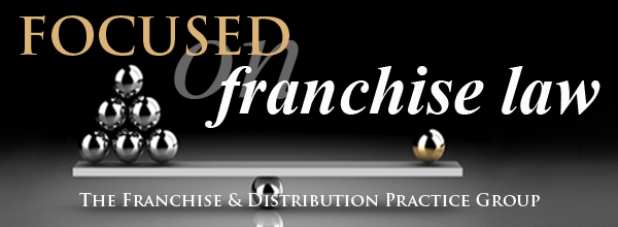DOL on Joint Employer Liability; and CA Expands Franchisee Protections

bkurtz@lewitthackman.com
dgurnick@lewitthackman.com
tgrinblat@lewitthackman.com
swolf@lewitthackman.com
msoroky@lewitthackman.com
kwallman@lewitthackman.com
tvernon@lewitthackman.com
January 2016
Barry Kurtz, David Gurnick & Tal Grinblat: Super Lawyers 2016
Three of our franchise law attorneys were selected as 2016 Super Lawyers, in the Franchise/Dealership category. Only 11 attorneys in all of Southern California were so named. Among them, Barry Kurtz, David Gurnick and Tal Grinblat have a combined 23 years of Super Lawyer recognitions. All three attorneys are also Certified Specialists in Franchise & Distribution Law, per the State Bar of California Board of Legal Specialization.
Tal Grinblat Co-Authors Legislation
As Co-Chair of the Franchise Law Committee, Tal Grinblat wrote an Affirmative Legislative Proposal (ALP) to enable franchisors wishing to test California markets to exhibit at trade shows without first registering as franchises. The ALP was approved by the Trustees of the California Bar and will now be introduced as a bill in Sacramento by Assembly Judiciary Committee Member Brian Maienschein. Click: BLS-2016-01 for further information.
San Fernando Valley Business Journal Quotes David Gurnick re PizzaRev
“It’s important for a franchiser to develop critical mass in a particular market before expanding into neighboring regions…” Read: Chain Offers Slice for further details.
Barry Kurtz Presentation at Southwestern University
Barry Kurtz co-presented a seminar regarding business law at his alma mater, Southwestern University. The one hour presentation, “Transactional Law in Practice” was geared towards law students and graduates of the school. Mr. Kurtz is an active member of the Alumni Association Board of Directors, which co-sponsored the event.
David Gurnick Speaks at San Fernando Valley Bar Association
David Gurnick participated in the San Fernando Valley Bar’s MCLE Marathon, giving a 90 minute presentation entitled “Online Negativity: How to Fight Back.” The marathon is held each year, and provides an opportunity for area lawyers to earn continuing education credits.
FRANCHISOR 101:
Department of Labor Weighs in on Joint Employer Liability

Recently, some plaintiffs – employees of franchisees – have tried to hold franchisors responsible for unpaid overtime and other claimed violations by franchisees they work for. They use the theory  that franchisors are their joint employer, along with the franchisee who hires, pays and directs them.
that franchisors are their joint employer, along with the franchisee who hires, pays and directs them.
In the latest development of the changing standard for joint employer liability, the U.S. Department of Labor (DOL) issued an Administrator’s Interpretation (“AI”) stating the analysis the DOL plans to apply in these cases.
The AI first distinguishes “horizontal” and “vertical” joint employment. Horizontal is where an employee works at the same time for two separate but related or overlapping employers. Vertical means the work an employee does for one direct or “intermediary employer” also benefits another company, the “potential joint employer.” The benefit exists because the direct or intermediary employer provides services benefitting another company that may include labor and some employer functions, like hiring and payroll. The DOL believes a franchise is vertical, in which the franchisee is an intermediary employer that makes the franchisor a potential joint employer. In the DOL’s view, a franchisee provides a labor force that benefits the franchisor by getting the franchisor’s product, whether foods or merchandise or services, to consumers.
The AI says that a vertical joint employment analysis “must be an economic realities analysis and cannot focus only on control.” It provides seven factors to be considered in determining if an employee “is economically dependent on the potential joint employer.” The factors suggesting economic dependence, and joint employment, are:
1. The employee’s work is directed, controlled, or supervised by the potential joint employer.
2. The potential joint employer may hire, fire, or modify the employee’s employment conditions.
3. The employee’s work that benefits the potential joint employer is full-time, of long duration, or permanent.
4. The employee’s work is repetitive or rote, requiring little skill or training.
5. The employee’s work is an integral part of the potential joint employer’s business.
6. The employee works on premises owned or controlled by the potential joint employer.
7. The potential joint employer performs administrative functions for the employee that would typically be performed by an employer, like handling payroll or providing transportation.
Some of these factors resemble the relationship between a franchisor and employees of its franchisees. But in a set of frequently asked questions accompanying the AI the DOL states that “the existence of a franchise relationship, in and of itself, does not create joint employment.” Which franchise relationships do create joint employment will be developed in future guidance and decisions.
FRANCHISEE 101:
California Expands Protections for Franchisees

California Assembly Bill 525, passed into law in 2015 applies to franchise agreements entered into or renewed on or after January 1, 2016. It expands and provides new protections for franchisees. Franchisees subject to California now benefit from the following provisions:
1. A franchisor may not terminate a franchise agreement for minor infractions; but may terminate only if the franchisee failed to substantially comply with lawful requirements imposed on the franchisee by the franchise agreement. The franchisor must give notice and at least 60 days opportunity to cure the default.
Exceptions: in certain severe events, such as franchisee bankruptcy or abandonment of the franchise business, a franchisor may give notice of immediate termination without an opportunity to cure.
2. On termination or non-renewal of a franchise, the franchisor must buy from the franchisee all inventory, supplies, equipment, fixtures, and furnishing purchased or paid for by the franchisee under the terms of the franchise agreement. The franchisor must pay for the items at the price paid, minus depreciation, and must buy any items the franchisee purchased from the franchisor or its approved suppliers and sources.
Exceptions: The franchisor need not buy items that were personalized, or that the franchisee was not contractually required to purchase. The franchisor need not purchase anything in certain situations, such as where a) termination or non-renewal is mutually agreed with the franchisee, b) the franchisor allows the franchisee to remain in the principal place of the franchise business, or c) termination or non-renewal is due to the franchisor’s “nondiscriminatory decision” to completely withdraw from all franchise activity in the relevant geographic market area where the franchise is located.
3. A franchisor may not prevent a franchisee from selling or transferring the franchise to someone else, so long as that party would qualify under the franchisor’s then-existing standards for the approval of new or renewing franchisees.
Exceptions: A franchisor may refuse to consent to a transfer or sale if the franchisee and buyer, transferee, or assignee do not comply with the transfer conditions specified in the franchise agreement. Also, the franchisor may still have a contractual right of first refusal, allowing it to purchase the franchise itself before allowing it to be transferred or sold to an outside party.
With these new laws in effect, added onto already existing protections for franchisees in the context of termination and nonrenewal, California is among the nation’s most franchisee-friendly states.
Source: California Assembly Bill 525
